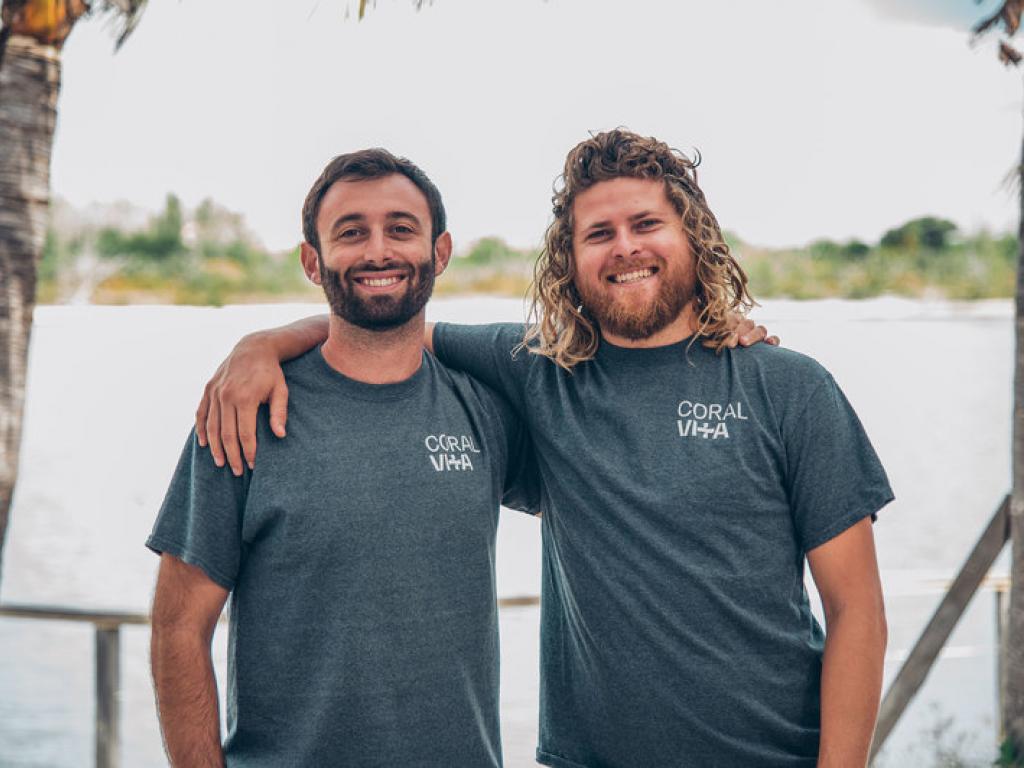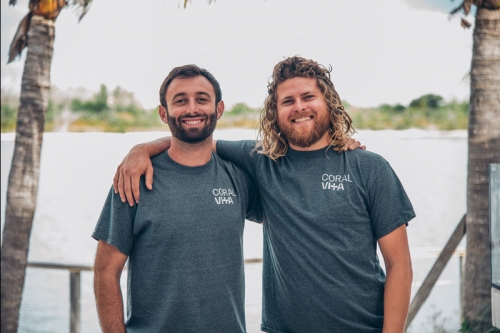UCT alum wins Earthshot prize for restoring coral reefs


UCT alum Gator Halpern (right) won the Earthshot prize for restoring coral reefs.
Trailblazing entrepreneur Gator Halpern, who recently scooped one of the most prestigious environmental awards in history, has credited the University of Cape Town (UCT) for helping to shape his mission to restore dying coral reefs.
Halpern, who won the Earthshot Revive our Oceans award with his Coral Vita business partner, Sam Teicher, spent a pivotal six months on a Semester Study Abroad programme at UCT in 2010.
The Earthshot awards were launched two years ago by Prince William and Sir David Attenborough, to generate a global movement to repair the planet. The inaugural winners were announced at a glittering awards ceremony at London’s Alexandra Palace in October.
Galpern and Teicher founded Coral Vita to solve one of the planet’s greatest environmental challenges – preserving coral reefs. Coral Vita creates high-tech coral farms. The coral is grown in tanks at a rate 50 times faster it grows in nature, and then outplanted into degraded reefs.
“Coral reefs are the first major ecosystem around the world where we’re seeing collapse due to climate change.”
“Coral reefs are the first major ecosystem around the world where we’re seeing collapse due to climate change. We’ve already lost half of the world’s coral reefs. The latest scientific projections predict that over 95% of the reefs on earth will be dead by 2050,” said Halpern.
Coral Vita is pushing against the tide to change the situation.
“Despite only covering less than a percent of the ocean floor, coral reefs support over a quarter of all known marine species. They’re the most biodiverse habitat on Earth. It’s a serious socio-economic issue too, because reefs provide enormous benefits to communities around the world and support the livelihoods of up to a billion people.”
Supplying the world
They aim to revive life in the ocean through their high-tech coral farm in Grand Bahama. Using Coral Vita’s methods, a single farm could potentially supply coral for an entire nation. Halpern and Teicher envisage a network of farms in all countries with coral reefs, with the ultimate goal of protecting reefs and boosting their resilience against warming oceans that threaten their survival.
Coral Vita was one of five winners in five categories chosen from 750 applications, include cutting-edge technologists, innovators, the country of Costa Rica for protecting and restoring nature, and the city of Milan for its work in pioneering food-waste hubs. The five category winners were selected by The Earthshot Prize Council, and were chosen for their groundbreaking solutions to the greatest environmental challenges facing our planet and their ability to scale their impact globally in response to the urgent challenges we face.
Winners receive £1 million in prize money and are given tailored support and opportunities to help scale their work.
For Halpern, the journey to the coveted award started when he was a child. Growing up in San Diego in California, the ocean always had a pull.
“I spent as much time as I could on the beach and in the waves. I have a deep passion and love for the ocean, and for the natural environment in general.”
“South Africa opened my eyes to the kind of issues that societies face around the world, and UCT played a key role.”
As an undergraduate, Halpern spent the first semester of 2010 in UCT’s Department of Environmental and Geographical Science, as part of UCT’s Globalisation, Environment & Society Semester Study Abroad programme that the department runs each year for up to 12 students from one of three US liberal arts colleges.
“South Africa opened my eyes to the kind of issues that societies face around the world, and UCT played a key role in kick-starting my academic career. The programme was great in fostering a global vision and discussing challenges,” he said.
“It led me into doing more research in environmental science, and eventually going to grad school at Yale, where we ended up founding Coral Vita. If I hadn’t had those experiences at UCT, I may never have ended up starting this company and pursuing the career path I’m on.”
Halpern describes UCT Professor Michael Meadows as a “mentor and key influence” on his life during his student years. He supervised Halpern’s research project.
Based on historical aerial photography, the research used geographical information systems (GIS) to map changing land use over the last 70 years in the Swartland region north of Cape Town. It showed how, in the last two decades, wheat farming has been giving way to vineyards and urbanisation in response to economic and demographic change in the region. The paper was published in The South African Geographical Journal.
Professor Meadows described the award as “an extraordinary achievement by a young man who has had the vision, the determination and the talent to do something tangible about a really serious environmental issue”.
“Gator and his partner are indeed blazing a trail in the quest for a sustainable future for the world’s coral reefs, at a time when these important systems are facing increasing pressure.
“When Gator was at UCT, he stood out among his peers – not only for his considerable academic ability and passion for what he believed in, but also for his bright and engaging personality,” said Professor Meadows.
A magical time
Halpern also played first-team football for UCT, and spent time travelling to the Kalahari desert and along the Garden Route.
“It was a magical time of my life, in which I made lifelong friendships.”
But despite Halpern’s clear career path in the environmental space, there have been swirling currents along the way.
Two years ago, he felt the effects of climate change in an intensely real way, when the most powerful hurricane ever recorded in the Caribbean, Hurricane Dorian, tore into the Caribbean coast – and Grand Bahama, where Coral Vita’s farm is based.
“A slow-moving tidal wave crossed over our island. The building was completely under water, all our tanks were washed out to sea, and the coral farm was destroyed.”
“The award will … help us to jumpstart our development of other farms around the world.”
Halpern said the surrounding fishing villages were also devastated, so their first priority was to help people who had lost their homes.
“There was nothing to stop the waves and storm surge from wiping the houses away. Finally, after a couple of months of relief work, we transitioned back to Coral Vita and started to rebuild the farm.”
As it turned out, they were able to expand the facility and make it stronger and better than it had been before the hurricane.
Halpern said the award is incredible recognition for the team, and for the community in the Bahamas who had been so welcoming and embracing of the project.
“Winning the award will allow us to do a few really important things. We will broaden the impact of our work in the Bahamas, and innovate in our faming model to create an even more scalable, more efficient way to grow the millions of corals we are hoping to grow in the near future. The award will also help us to jumpstart our development of other farms around the world.”
Story: Kim Cloete
Photo: Coral Vita
